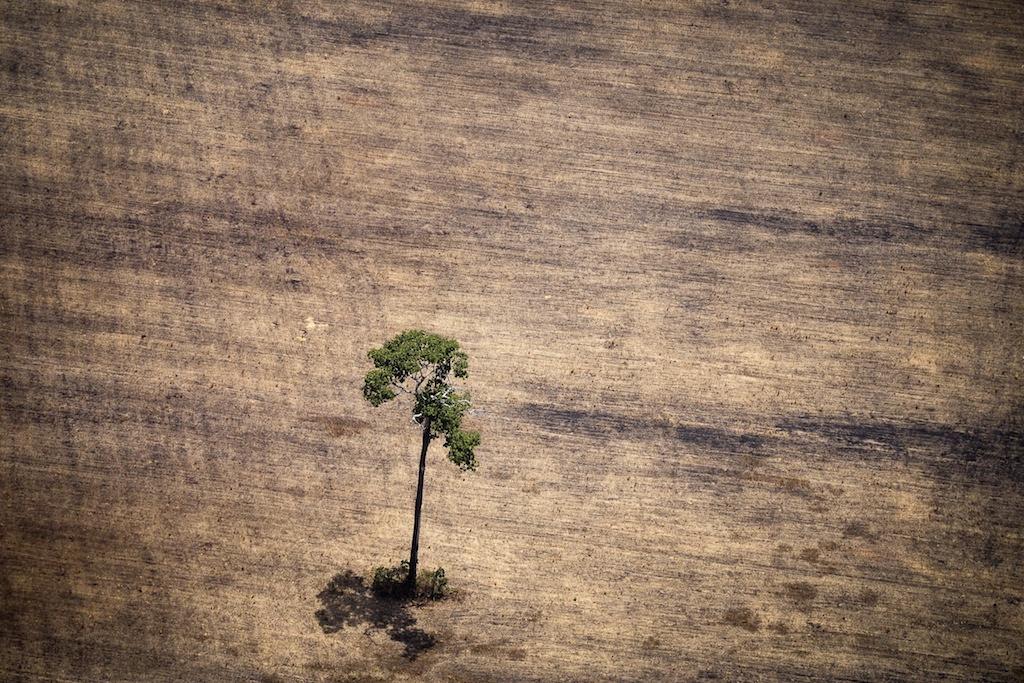Brazil’s cabinet now has a climate change denier and a ‘chainsaw queen’
A tree in a deforested area in the Amazon jungle, in Para state, seen during an overflight in October by Greenpeace activists.
LIMA, Peru — Two new key officials in Brazil’s government have sparked renewed fears for the Amazon — and the impact further deforestation there could have on the planet.
Brazil’s recently named science, technology and innovation minister, Aldo Rebelo, has claimed global warming is “incompatible with current knowledge.”
And the new agriculture minister, Katia Abreu, is such a fervent champion of agribusiness that green campaigners have dubbed her the “chainsaw queen” — a reference to deforesting lands for crop cultivation.
Together, they’re reigniting concerns about the world’s largest tropical rain forest and the billions of tons of carbon that clear-cutting would dump into the atmosphere.
The pair was appointed to President Dilma Rousseff’s cabinet on Jan. 2 as she began her second four-year term at the helm of Latin America’s largest nation.
More from GlobalPost: 97 percent, 49 billion, and 3 other convincing climate change numbers
A senior Communist Party congressman, Rebelo’s legislative record calls into question the claim often made by green groups that capitalism is killing the planet.
It’s not that corporations don’t have a long track record of causing terrible environmental damage, such as the Exxon Valdez disaster in Alaska or the unsustainable plunder of the world’s fisheries.
But so do communists, as a cursory look at the former Soviet bloc’s long list of ecological catastrophes, from the Chernobyl nuclear disaster to the vanishing Aral Sea, will confirm.
As a lawmaker, Rebelo was the architect of his country’s new forest law that environmentalists blame for the recent uptick in Amazonian deforestation.
That prompted Greenpeace to target Rebelo with a letter-writing campaign calling on him to leave the giant jungle alone.
Indeed, his rhetoric on climate change almost makes some US Republicans and Australian Prime Minister Tony Abbott seem moderate.
In this June letter to a fellow Brazilian congressman, helpfully translated to English by Steve Schwartzman of US group the Environmental Defense Fund, Rebelo describes climate change as:
• having “no scientific proof”
• “a construct based on computer simulations”
• “an unshakeable dogma”
Schwartzman, the Fund’s director of tropical forest policy with a PhD in anthropology, warns in his blog post that Rebelo’s appointment is a national embarrassment for Brazil:
“Memo to Dilma: Picking a Science Minister whose idea of state-of-the-art thinking on the relation between humanity and nature is the 19th century Karl Marx protege Friedrich Engels, is making your friends in the international community roll their eyes and cringe.”
But Abreu’s appointment could be more pivotal. She's a former senator and head of Brazil’s National Confederation of Agriculture, which represents large-scale farming interests in one of the world’s largest exporters of beef, corn and other commodities. Abreu is likely to have a greater influence on Amazon policies.
She is a supporter of the proposed Constitutional Amendment 215, which the farming lobby says would better demarcate farmland boundaries but which indigenous activists claim would effectively prevent native communities from owning their ancestral lands.
Danicley Aguiar, an Amazon campaigner with Greenpeace Brazil, accuses Abreu of being someone who “prioritizes profit at the expense of the preservation of the environment.”
Green activists have long complained that President Rousseff, along with her predecessor and center-left Workers Party mentor Luiz Inacio “Lula” da Silva, have been deaf on environmental matters, especially in the Amazon, by far the world’s largest surviving tropical rain forest.
During her last term, Rousseff did help tone down Rebelo’s forest code, but she rarely even mentions the environment in her speeches.
More from GlobalPost: Brazil's hydro dams could make its greenhouse gas emissions soar
Paulo Barreto, a forester at Imazon, a Brazilian think-tank specializing in Amazon conservation, told GlobalPost that Rousseff had overseen policies that jacked up Brazil’s carbon emissions, including curbing natural protected areas — paving the way for deforestation — and slashing a gasoline tax.
Yet, until she was squeezed out, Lula’s first environment minister was Marina Silva, a former Amazonian rubber-tapper beloved by environmentalists and whose policies were credited with pushing down deforestation rates during her 2003-2008 tenure.
Analysts say the new appointments are the result of Rousseff’s need to shore up broad-based political support as she enters a second term weakened by corruption scandals, a splintered congress and sputtering economy.
They will also mean that environment nonprofits, the private sector and ordinary citizens will now have to take the lead regarding the Amazon and climate change policies in Brazil, Barreto says.
“They [Abreu and Rebelo] have been leaders in the process that pardoned some of the illegal deforestation in Brazil by changing the Forest Code,” Barreto adds. “They have done so despite warnings from the Brazilian Academy of Science.”
And with Brazil a major player in the negotiations toward a 2015 global climate treaty, the fraught process of cat-herding nearly 200 governments to agree on how to save the planet may also have just become that little bit harder.
Every day, reporters and producers at The World are hard at work bringing you human-centered news from across the globe. But we can’t do it without you. We need your support to ensure we can continue this work for another year.
Make a gift today, and you’ll help us unlock a matching gift of $67,000!
